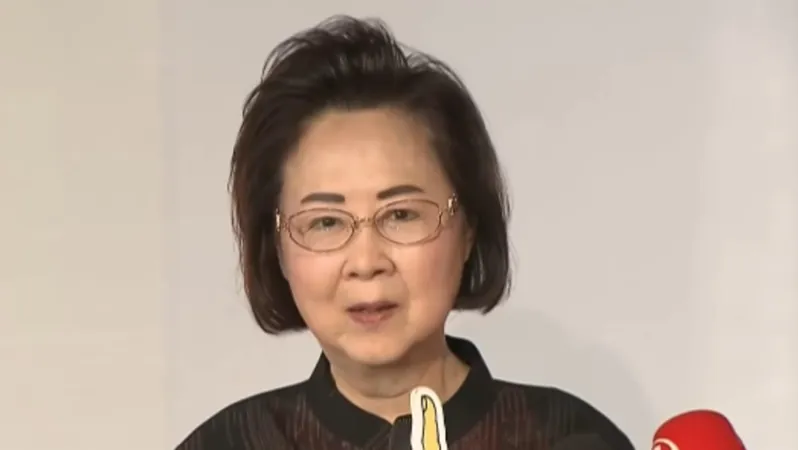
Shocking Loss of Beloved Novelist Chiung Yao Fuels Urgent Conversations on Elderly Suicide and Euthanasia in Taiwan
2024-12-13
Author: Yu
Shocking Loss of Beloved Novelist Chiung Yao Fuels Urgent Conversations on Elderly Suicide and Euthanasia in Taiwan
In a tragic turn of events, the unexpected passing of Chiung Yao, a celebrated Taiwanese novelist, has ignited a nation-wide dialogue about the pressing need for improved support for the elderly and the controversial topic of euthanasia. Chiung, who was in apparent good health, made the heartbreaking decision to end her life on November 28, just days after sharing an emotional tribute to her late husband, esteemed publisher Ping Hsin-tao, who passed away in 2019.
The couple, married for an incredible forty years, shared a profound love for literature and a life of memorable experiences. However, the dark clouds of family disputes during Ping’s final years—particularly surrounding decisions about his medical care—cast a shadow over Chiung Yao's latter days. Following these events, she became an outspoken advocate for voluntary euthanasia in Taiwan, a topic that remains heavily debated and illegal in the country.
In her poignant farewell note, Chiung Yao reflected on the importance of living fully and emphasized that her decision stemmed from a rich and fulfilling life. She urged her readers to embrace life's challenges, stating, "Momentary setbacks or negative events hone you for a beautiful life," and expressed hope for future humane solutions allowing the elderly to pass away with dignity.
The outpouring of grief and sympathy following her death has been met with contrasting opinions. While many mourned the loss of a literary icon, others voiced support for her choice, highlighting the struggle of those facing unbearable circumstances. Retiree Rebecca Chen, age 70, noted, "Taiwan should have euthanasia because sometimes we just want to leave the world happily." In stark contrast, some expressed disappointment and disbelief, voicing concerns over the permanence of such decisions.
Meanwhile, Taiwan faces a growing crisis with suicide rates among its elderly population, which are alarmingly high compared to other age groups. Official reports indicate that individuals over 65 are particularly vulnerable, a demographic where loneliness and diminishing health can lead to feelings of worthlessness. Liu Su Fang, chairwoman of the Teacher Chang Foundation, pointed out the critical need for societal support and suggested that increasing community engagement is vital for combating isolation.
Around 20% of seniors in Taiwan currently live alone, a trend expected to rise in the coming years. In response to this silent epidemic, Taiwanese authorities have taken measures to improve palliative care and establish over 1,600 support stations to assist elderly citizens with physical and mental challenges. The government is also promoting the construction of age-friendly residential areas equipped with necessary facilities.
As Taiwan approaches the status of a "super-aged" society—with projections indicating that 20% of the population will be over 65 by next year—advocates are urging families to engage more with their elderly relatives. The call to action is clear: checking on their emotional wellbeing and encouraging social participation can be a lifesaver.
In the wake of Chiung Yao's passing, it is clear that the conversation surrounding elderly rights, mental health, and euthanasia is more urgent than ever, prompting call for immediate action in a society that cannot afford to overlook its elderly population. The question remains—how long can Taiwan ignore the cries for help from its senior citizens?

 Brasil (PT)
Brasil (PT)
 Canada (EN)
Canada (EN)
 Chile (ES)
Chile (ES)
 España (ES)
España (ES)
 France (FR)
France (FR)
 Hong Kong (EN)
Hong Kong (EN)
 Italia (IT)
Italia (IT)
 日本 (JA)
日本 (JA)
 Magyarország (HU)
Magyarország (HU)
 Norge (NO)
Norge (NO)
 Polska (PL)
Polska (PL)
 Schweiz (DE)
Schweiz (DE)
 Singapore (EN)
Singapore (EN)
 Sverige (SV)
Sverige (SV)
 Suomi (FI)
Suomi (FI)
 Türkiye (TR)
Türkiye (TR)